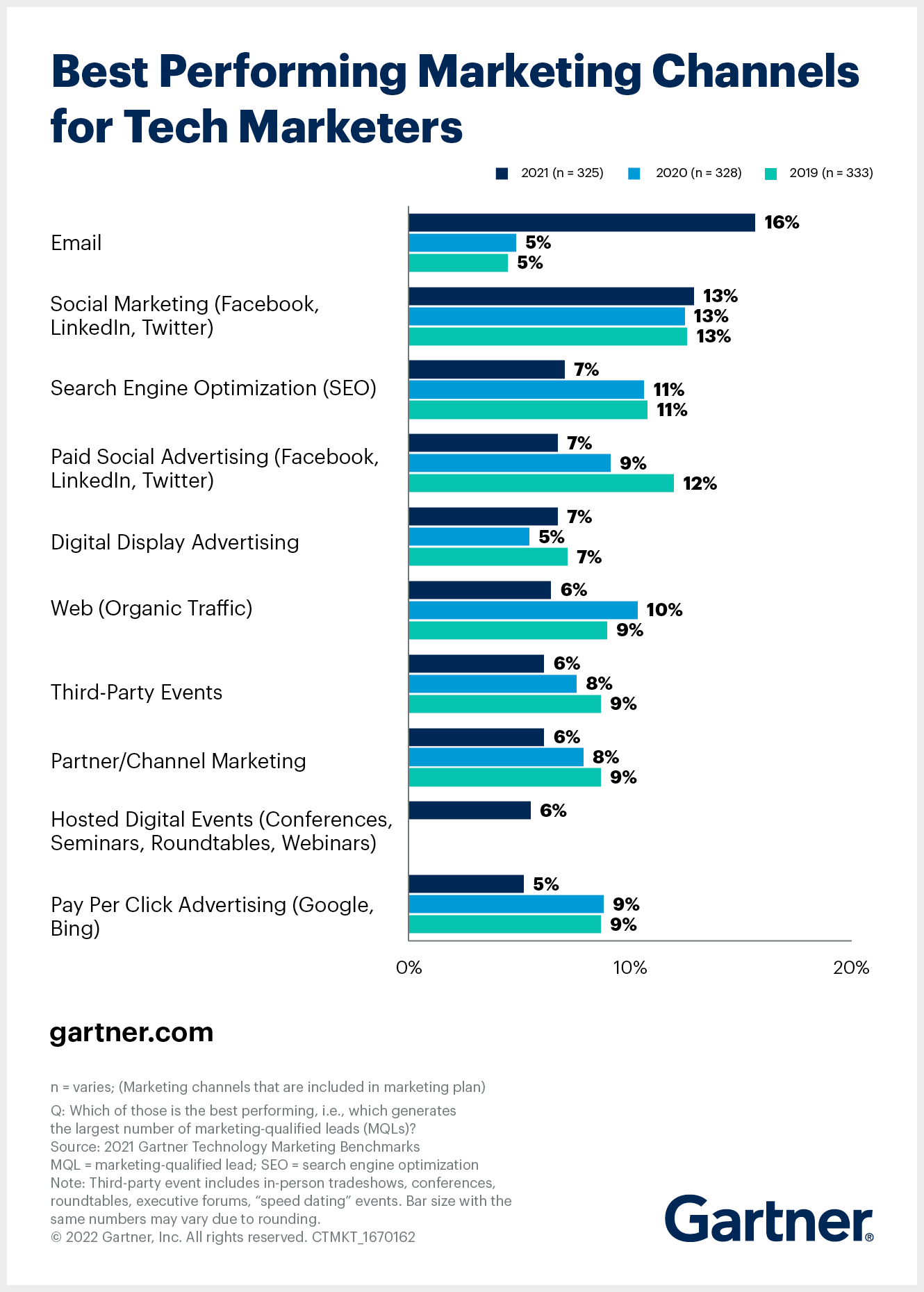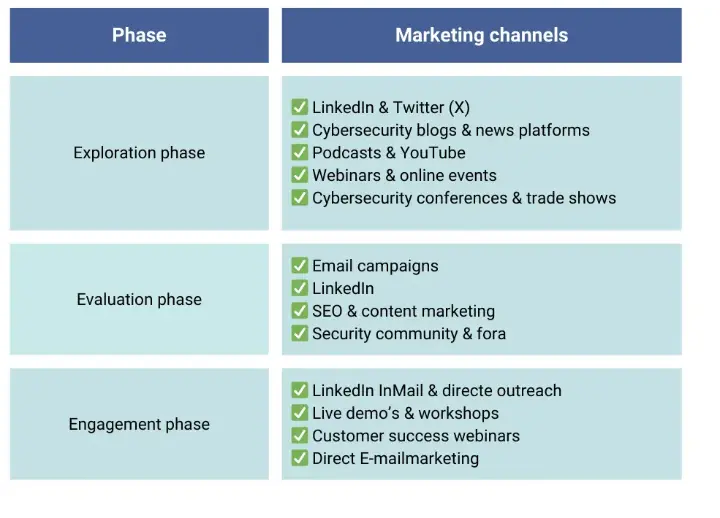CTA’s, Marketing Channels and Buyer Personas
Deploying more marketing channels or adding more random CTAs (call to actions) does not automatically lead to more qualified leads, yet we see that for many Flemish SMEs in the tech sector, this is a common pitfall.
The key to success? Focus on the right channels and targeted CTAs that perfectly match your target audience. Quality over quantity - it's about reaching the right people at the right time.
What we cover in this article:
- Create CTAs that perfectly match what your customers do and want, at every moment of their purchase.
- Effective lead generation starts with the right mix of marketing channels at the right stage of the decision process.
- Buyer personas are the key to success: marketing that reaches the right people produces better results.
1. Appropriate CTAs at the right stage
Create CTAs (Call To Actions) that seamlessly match the stage your potential customer is at in the buying cycle. Think carefully about their needs at that moment and respond strategically.
In this chapter, we focus on three crucial phases in the buying cycle: the exploration phase, evaluation phase and engagement phase.
The exploration phase: the first encounter
In the exploration phase, it all starts with a problem. Your potential customer has a challenge and is looking for solutions, but is not yet ready to tie the knot. Help them by asking questions that make them think. Where is this on their priority list? What are competitors doing? Offer them valuable content that informs and inspires them: thought leadership articles on industry trends, white papers, engaging videos, podcasts with experts or webinars on the future of their field.
The evaluation phase: the comparison
Once interest is sparked, the potential customer proceeds to the evaluation phase. They compare different suppliers and research what each has to offer. Now is the time to focus on the unique value you offer. How do you solve their specific problems? Show what you have to offer with concrete examples: outcome-based case studies that demonstrate results, free trials or convincing demonstrations of your product, and webinars in which you clearly explain the differences with the competition.
The engagement phase: the decision approaches
In the final phase, the engagement phase, the potential customer is ready. They want to go deeper into the details and are ready to enter into the collaboration. Now it is important to enable direct contact. Facilitate meeting requests or organise exclusive events where they can meet your team.
In short, the right CTAs at the right time, tailored to the stage of the buying cycle, make the difference between a missed opportunity and a successful lead
2. Choose the right marketing channels for your content
You now have strong CTAs and valuable content. The next step is to choose the right marketing channels to spread your message effectively. Think carefully about where your potential customers are looking for their information and on which platforms they are active.
Not every channel delivers the same results. Some require more time and effort, but can lead to higher-quality leads. It is therefore important to strategically determine which channel best suits your goals.
In this chapter, we focus specifically on the cybersecurity sector to give you a concrete picture of how to put this approach into practice.
We maintain a focus on the three crucial phases in the acquisition cycle: the exploration phase, evaluation phase and engagement phase.

Source :
The exploration phase: where do you find your customer?
In the exploration phase, it is crucial to understand where your potential customer is and how they gather information. Ask yourself the following questions:
Effective marketing channels at this stage.
- LinkedIn & Twitter (X): Security professionals and IT decision-makers follow subject matter experts, companies and thought leaders here.
- Cybersecurity blogs & news websites: Post guest blogs or sponsor content on platforms such as Dark Reading, CSO Online, Threatpost and TechCrunch.
- Podcasts & YouTube channels: Consider sponsoring existing channels or create your own content.
- Cybersecurity Webinars & Virtual Events: Organise or participate in online panels and discussions on current security challenges.
- Industry events & conferences: Think Black Hat, DEF CON, RSA Conference and Infosecurity Europe. Establish a strong presence and network with potential customers.
The evaluation phase: keeping attention
In the evaluation phase, you have created interest. Now it is important to keep their attention and stay top of mind. Make optimal use of your own channels (website and social media), but also consider targeted e-mail campaigns to reinforce your message.
Effective marketing channels at this stage.
- Email campaigns: Send targeted emails with case studies, testimonials and product comparisons. Use marketing automation (e.g. HubSpot or Odoo).
- LinkedIn Ads & retargeting: Use targeted ads to re-target your solution.
- SEO & content marketing: Optimise blog articles and white papers with cybersecurity-related keywords. Be visible on Google for queries such as ‘best endpoint security solution 2024’.
- Security community & forums: Actively participating on platforms such as Reddit r/netsec, Spiceworks and Cybersecurity Insiders helps in authority building and engagement.
The engagement phase: closing the deal
In the engagement phase, your potential customer is ready to tie the knot. They want to know the final details and have certainty that they are making the right choice. This is the time to boost their confidence and guide them to a decision without barriers. Make it easy to schedule an appointment and demonstrate your expertise, positioning yourself as the ideal partner.
This phase is all about targeted interaction and personal follow-up. Your content should further educate and convince the buyer, with a strong focus on their specific needs. Webinars, Demos and 1-on-1 Meetings are particularly effective to remove the last doubts.
Effective marketing channels at this stage.
- LinkedIn InMail & direct outreach: Your sales team can connect directly with decision-makers via LinkedIn to schedule an appointment and close the deal. A personal and relevant approach increases the chances of conversion.
- Live demos & product workshops: Organise exclusive deep-dive sessions for IT managers and cybersecurity experts.
- Email marketing & personalised follow-ups: Personalise your emails based on previous interactions (e.g. demo requested, whitepaper downloaded) and share exclusive offers or trial periods to facilitate the decision.
- Customer success webinars: Let existing customers share their success stories in a webinar. This builds confidence and helps prospects with their last doubts.
Summary: Cybersecurity Marketing channels by phase

In short, the right marketing channels, tailored to the stage of the buying cycle and your customer's needs, are essential for a successful marketing strategy.
3. Target your marketing to the right people
Just adding CTAs and using random marketing channels without a clear picture of your target audience does not work. Your conversions will only really improve if you align your marketing perfectly with your buyer personas - the ideal customer profiles you have developed. A thoughtful strategy takes into account who you are trying to reach, what drives them and how they make decisions.
From CEO to CTO: everyone is different (an example)
Take a CEO as an example. This person is usually in the exploration phase and mainly looks at the big picture. How can business processes become more efficient? Are there new trends they should follow? What innovations can give their company a competitive advantage? They seek strategic insights and reliable information, often through:
On the other hand, you have the CTO within the same company. He is often more in the evaluation phase, looking for concrete solutions. What are the technical differences between the products? Which technology fits best with the existing infrastructure? What about integrations and security compliance? They get their information from:
Each stage requires a targeted approach
Each stage in the buying cycle requires a different approach, and each person within a company has their own priorities and information needs. Therefore, a one-size-fits-all approach is not effective. You need to adapt your marketing channels, CTAs and content based on who you are trying to reach and what stage of the buying process they are in.
Know your audience, and your marketing will be truly effective!

